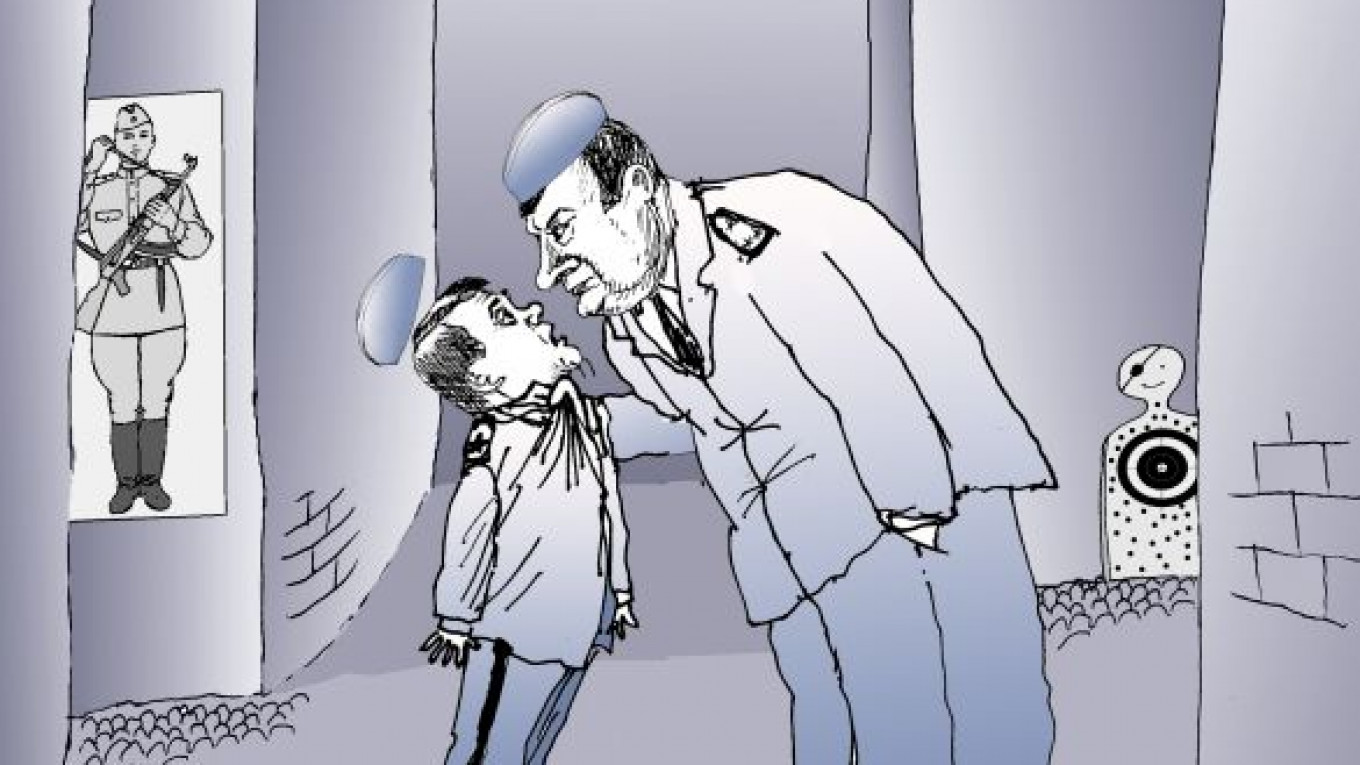The most common type of military hazing is when senior soldiers beat up junior ones. But there is also the reverse form of this when it is the senior leaders who get beaten up. For example, when sergeants finish training, they are no older and have no more combat experience than the soldiers they are supposed to command. As a result, those soldiers often refuse to follow orders of their superiors and sometimes even beat them.
A similar thing is happening in the government now. Several months ago, when President-elect Vladimir Putin announced his intention to appoint outgoing President Dmitry Medvedev as prime minister, Institute of Contemporary Development president Igor Yurgens predicted that Medvedev would have difficulty managing his senior and more experienced ministers.
Yurgens was right.
Medvedev wanted to publicly scold his subordinate ministers during his visit last week to the military compound located in Pokrovskoye outside Moscow. The reason for Medvedev's anger was that the Cabinet had failed to submit a report to him by a June 15 deadline detailing how military compounds across Russia would be transferred to local authorities.
Speaking to Deputy Prime Minister Dmitry Kozak, Medvedev said angrily: "I want you to personally tell me who is responsible for failing to report on this, along with your recommendation for disciplinary action. This is serious, and somebody must lose his job for it."
"Then it should be me," Defense Minister Anatoly Serdyukov interjected, "because I do not see how we can transfer money-losing operations to local authorities."
This issue has been dragging on for years. With military reforms leading to a drastic reduction in the number of units and troop formations, the military has vacated a few hundred of these compounds with the intention of handing them over to local governments to run. But the local governments have demanded that major repairs be made to the structures first and that money be allocated to maintain the buildings for a year into the future. But Serdyukov says utilities rate increases have used up that money, leaving a deficit of 70 billion rubles ($2.16 billion).
Everybody involved in the process is familiar with the problem. Nobody can agree on who will bear the cost of transferring ownership because budgets are tight everywhere. That is why the parties involved decided to hold their talks outside of the media spotlight.
But Medvedev spoiled these plans when he went public. Although Medvedev tried to show everyone who's boss, Serdyukov immediately put Medvedev in his place. It was interesting to see how Medvedev tried to counter by saying, "Then you should have called me and said you had not developed the procedure for the transfer because of this problem."
But Serdyukov would not back down. He answered by saying he had submitted the necessary paperwork to the government justifying his refusal. Medvedev could only tell Serdyukov that he should have reported to him personally. Medvedev attempted to save face by directly ordering Serdyukov to report within five days on how the funding of the military compounds would be calculated.
Throughout his presidency, Medvedev never came into conflict with Serdyukov, even during serious crises such as the Russia-Georgia war in 2008 or attempts by generals to sabotage military reforms. On the contrary, Medvedev was full of superlatives in describing Serdyukov's actions. "Regardless of the comments and criticisms, Anatoly Serdyukov is a successful minister who has done more during the past four or five years to reform the Defense Ministry than anybody else before him," Medvedev said during an interview on "Posner" on Channel One in early June.
For his part, Serdyukov was never guilty of insubordination. He never even hinted at the idea that because President Vladimir Putin had appointed him defense minister in 2007, he was not obliged to obey orders from anybody else.
But now, Serdyukov, well-versed in the unwritten rules of Putin's court, spoke his mind. He obviously felt entitled to do so. It turns out that he had respected Medvedev only in the capacity of president and commander-in-chief, not as prime minister.
Serdyukov probably received Putin's permission to lash out at Medvedev, and it is entirely possible that Serdyukov feels he is doing Putin a favor by remaining at the difficult post of defense minister. For these reasons, Serdyukov doesn't feel he needs to answer to Medvedev over trivialities. In either case, Medvedev was clearly shown his place. Medvedev should probably feel lucky he didn't get a slap in the face as well.
Alexander Golts is deputy editor of the online newspaper Yezhednevny Zhurnal.
A Message from The Moscow Times:
Dear readers,
We are facing unprecedented challenges. Russia's Prosecutor General's Office has designated The Moscow Times as an "undesirable" organization, criminalizing our work and putting our staff at risk of prosecution. This follows our earlier unjust labeling as a "foreign agent."
These actions are direct attempts to silence independent journalism in Russia. The authorities claim our work "discredits the decisions of the Russian leadership." We see things differently: we strive to provide accurate, unbiased reporting on Russia.
We, the journalists of The Moscow Times, refuse to be silenced. But to continue our work, we need your help.
Your support, no matter how small, makes a world of difference. If you can, please support us monthly starting from just $2. It's quick to set up, and every contribution makes a significant impact.
By supporting The Moscow Times, you're defending open, independent journalism in the face of repression. Thank you for standing with us.
Remind me later.







